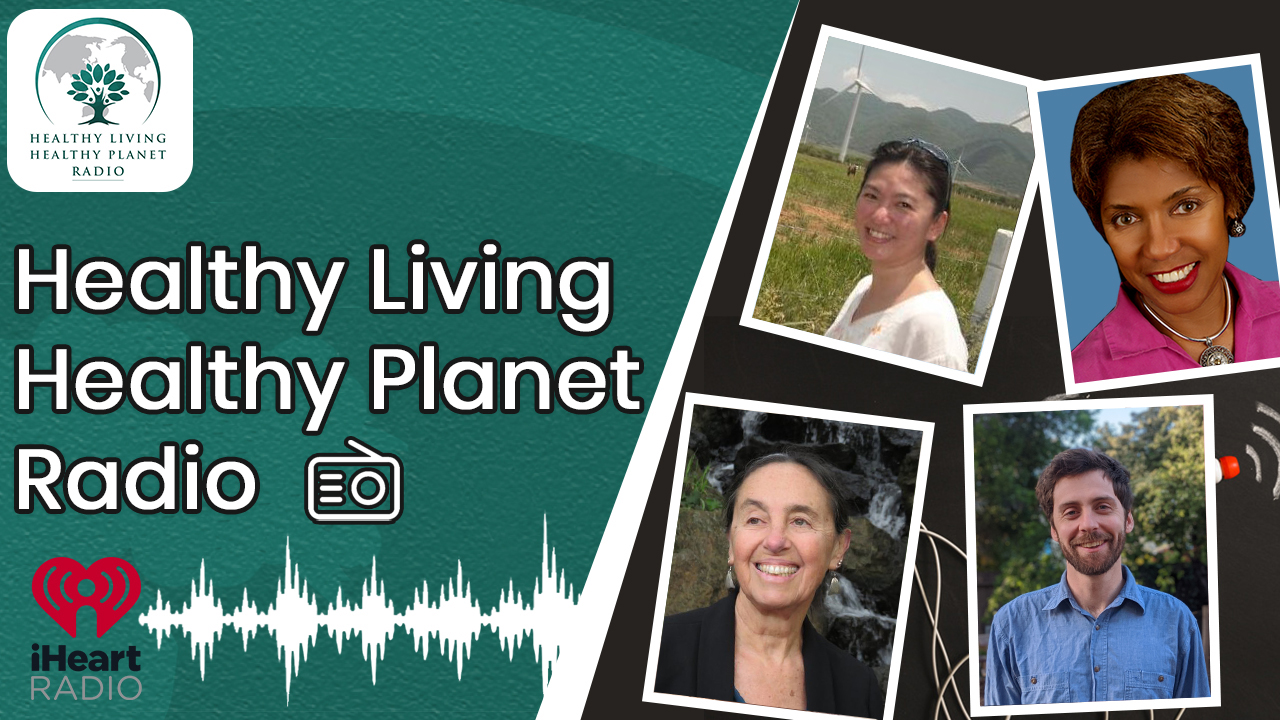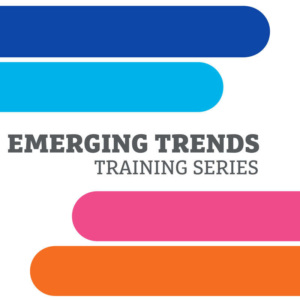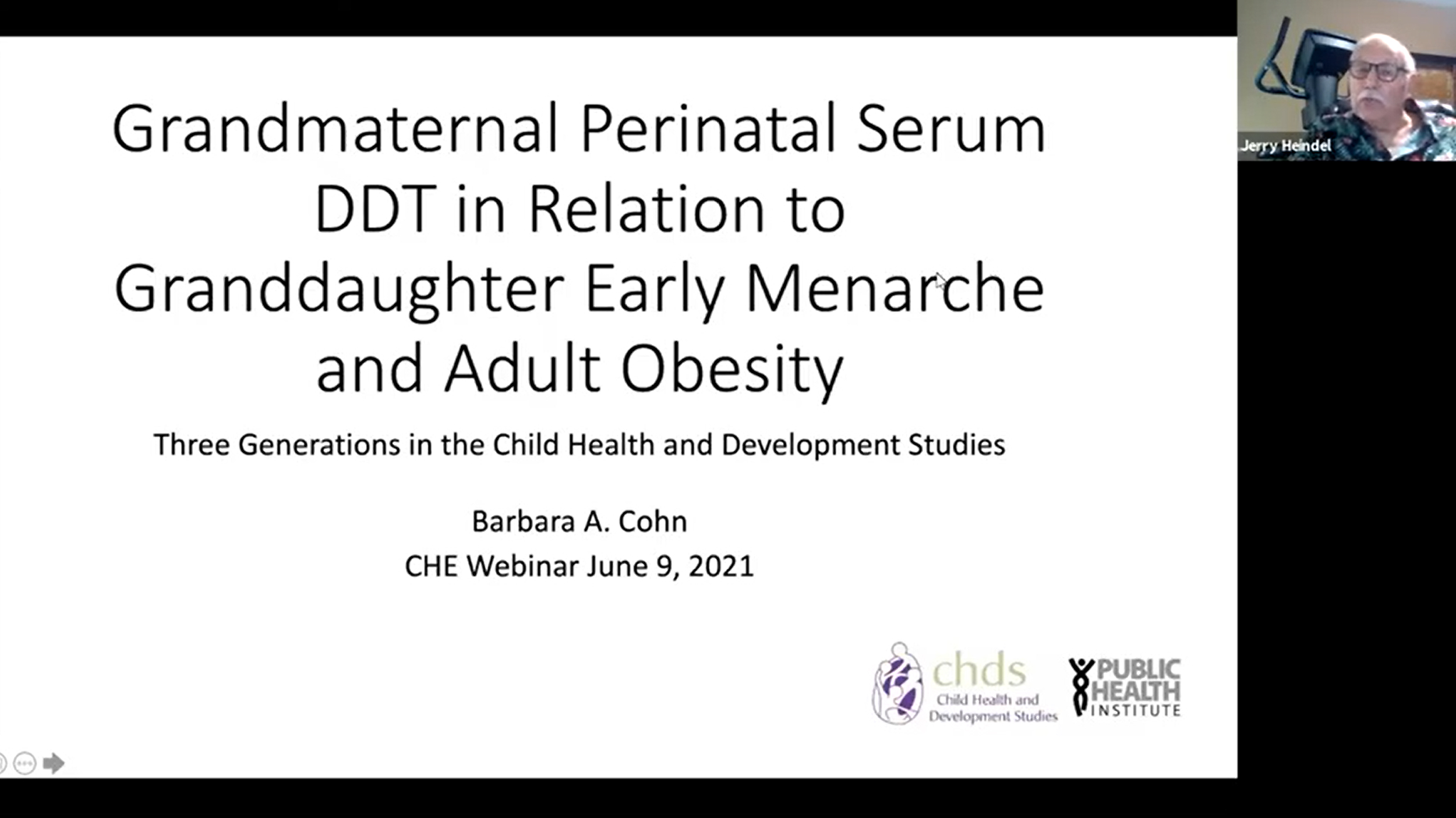PHI/CDC Global Health Podcast: Stories from the Field
The PHI/CDC Global Health Podcast features stories from the PHI/CDC Global Health Fellowship Program, a U.S. Centers for Disease Control and Prevention-funded program, implemented by the Public Health Institute, where Fellows are guided by leading global health experts from the CDC.
Stories from the front lines of global health
Learn how Fellows from the PHI/CDC Global Health Fellowship Program are working to improve health, in the US and around the world. Fellows work on the front lines of global health, developing the technical and professional skills needed to make meaningful contributions to today’s global health challenges.
In 2022, the PHI/CDC Global Health Fellows Podcast was named a Top 12 Global Health podcast by Global Health Hub Germany.
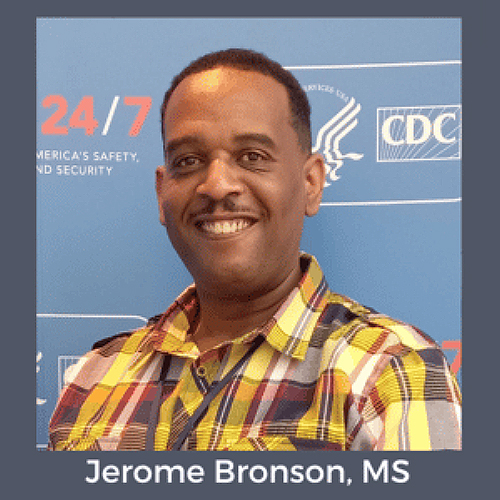
Episode 23: Health Equity & Data Modernization at CDC with Jerome Bronson, MS
Jerome Bronson, MS currently works in CDC’s Office of the Deputy Director for Public Health Service and Implementation Science, serving as a PHI/CDC Global Health Fellow focused on health equity and data modernization. He is also a DrPH candidate at Jackson State University, concentrating in Health, Policy, and Management. Jerome discusses his path to the fellowship and his work in health equity. To learn more about Jerome, you can access his website at jeromebronson.com.
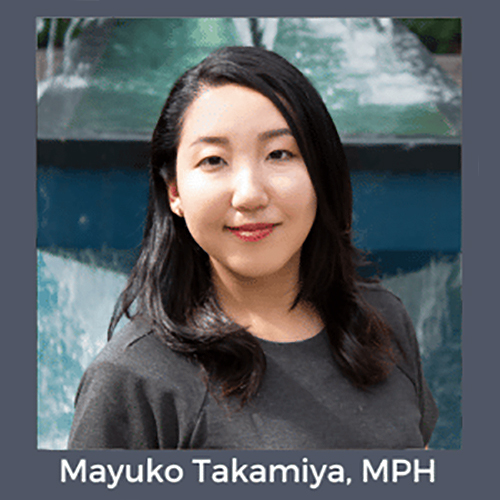
Episode 22: From CDC Zimbabwe to the WHO with Mayuko Takamiya, MPH
Mayuko Takamiya, MPH currently works for the World Heath Organization in Geneva, Switzerland. Previously, she was an Epidemiology Fellow for two years for CDC in Zimbabwe, which is part of CDC’s Center for Global Health. She discusses her path that lead her to the fellowship, her assignment as a fellow and what she’s working on now.
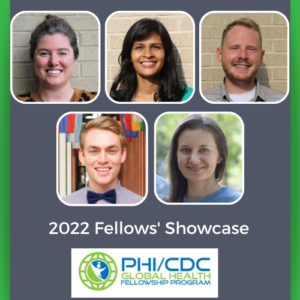
Episode 21: 2022 PHI/CDC Fellows’ Showcase with Fellows Will, Sarah, Caleb, Nessa and Malavika
In July 2022, the PHI/CDC Global Health Fellowship Program invited fellows to highlight their work throughout the year in a virtual event called the Fellows’ Showcase. Fellows and CDC mentors and CDC host office staff from the US and all over the world tuned in to hear what our fellows had been working on. Fellows based in the US and the country of Georgia are highlighted in this episode. Topics included capacity building, operations and relationships. The guests this episode are Mike Sage MPH, Will Jardell MPH, Sarah Legare MPH, CPHQ, Caleb Ward MPH, Dr. Nessa Ryan, and Malavika Divakaran MPH.
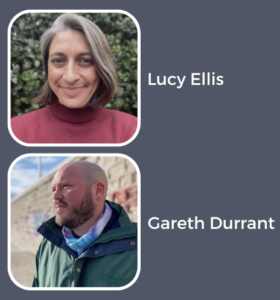
Episode 20: Designing for Systems Innovation & Leadership with Lucy Ellis & Gareth Durrant
Lucy Ellis is Program Architect and Advisor of the Unnamed Road, part of Designing for Systems Innovation and Leadership (DSIL). She spent several years working on leadership development and organizational design in CDC’s Center for Global Health, both internally and with health systems around the world. She now works with The Ready helping organizations and leaders from all sorts of sectors cut through bureaucracy and hierarchy that are holding them back in order to meet the complexity and uncertainty in which we all work today.
Gareth Durrant is a Designer and Facilitator for the Unnamed Road, part of Designing for Systems Innovation and Leadership (DSIL). He is an expert in ensuring successful projects can merge private sector innovation and development. He uses human-centered design tools matched with bold facilitation skills to leverage public health strengths and apply those to evolving challenges in the social impact world.
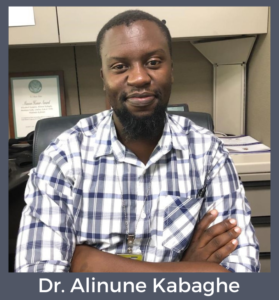
Episode 19: Perspectives from the Field with CDC in Malawi with Dr. Alinune Kabaghe
Dr. Alinune Kabaghe is a medical doctor and an Epidemiologist for the Epidemiology and Strategic Information Branch at the US Centers for Disease Control and Prevention in Malawi. At the time of recording this interview, Dr. Kabaghe was in a rural area of Malawi responding to the polio outbreak. He discusses his past work addressing malaria, and current work in global health on HIV, COVID-19 and the polio response. Thank you to current fellow, Reno Stephens, MPH, who also contributed to this episode.
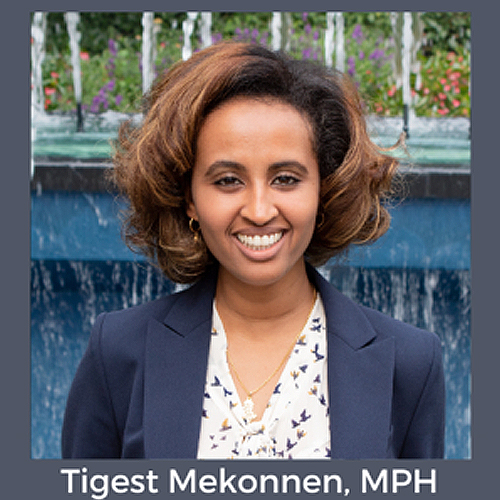
Episode 18: Supporting CDC in Malawi with Tigest Mekonnen, MPH
Tigest Mekonnen, MPH is a current PhD student at Emory University and a former Surveillance Fellow for the Epidemiology and Surveillance Branch for CDC Malawi, which is part of CDC’s Center for Global Health. Tigest discusses her path to the fellowship, her work as a fellow before and after the pandemic began, and lessons learned along the way. Thank you to current fellow, Mallory Michalak, MPH, who also contributed to this episode.
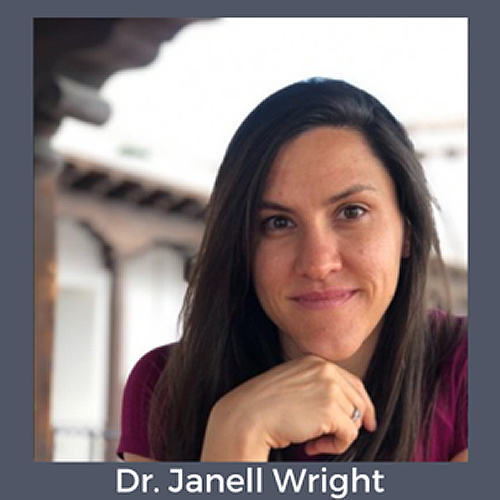
Episode 17: Perspectives from CDC Central America with Dr. Janell Wright
Dr. Janell Wright is the Regional Director of the Division of Global HIV and Tuberculosis for CDC Central America, which is part of CDC’s Center for Global Health. Janell started at CDC as a fellow and is now a mentor for the PHI/CDC Global Health Fellowship Program. She is based in Guatemala and previously worked for CDC in Vietnam and Kazakhstan. Thank you to her fellow, Cristine Gutierrez, MPH, who contributed to this episode.
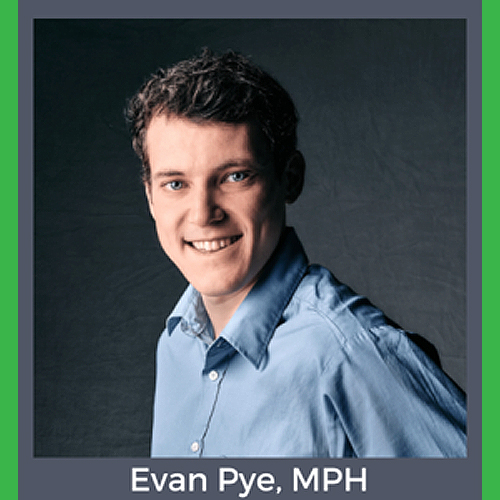
Episode 16: Global Health Policy with Evan Pye, MPH
Evan Pye, MPH is a Program Management Fellow for CDC’s Center for Global Health based in Washington D.C.. Evan discusses global health policy, his work responding to COVID-19 within the Emergency Operations Center at CDC and his previous work experience with WHO and various organizations in Uganda.
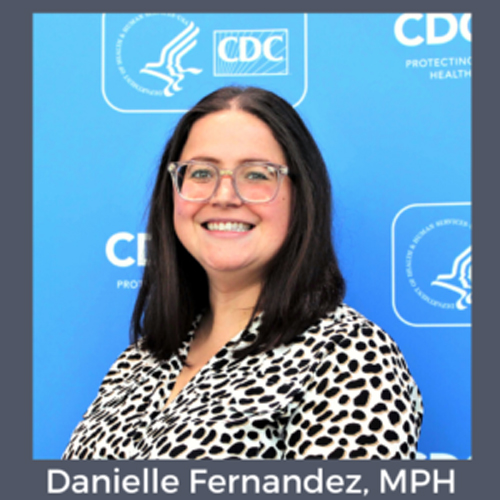
Episode 15: Outbreak Investigation and Response with Danielle Fernandez, MPH
Danielle Fernandez, MPH is a Global Health Surveillance Fellow with the Epidemiology and Surveillance Branch, part of the Division of Global HIV and TB at CDC’s Center for Global Health. Danielle discusses her previous work in outbreak investigation, including Ebola and Zika. She elaborates on her work on HIV case surveillance with CDC in Tanzania and Zimbabwe, along with COVID-19 with CDC.
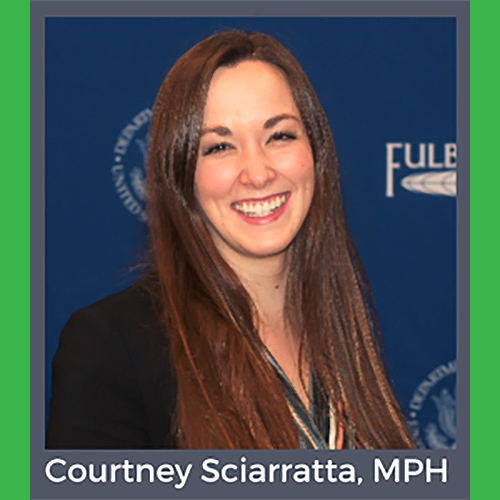
Episode 14: Global Epidemiology & Immunization Safety with Courtney Sciarratta, MPH
Courtney Sciarratta, MPH, is a PHI/CDC Global Epidemiology Fellow with the Global Immunization Safety Team in the Global Immunization Division at CDC’s Center for Global Health. Courtney discusses her time spent working in global health in Latin America and Uganda, and her work on global immunization and the COVID-19 response with CDC.
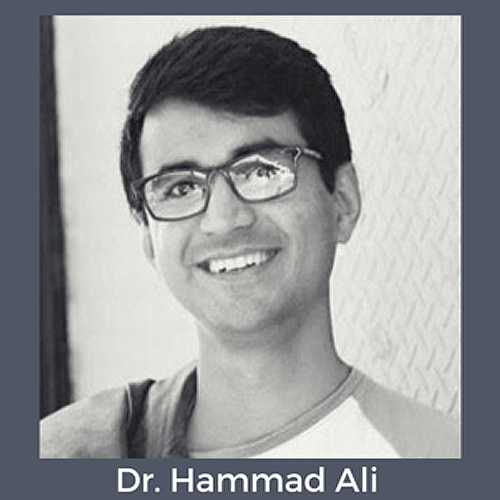
Episode 13: Medical Epidemiology at CDC’s Center for Global Health with Dr. Hammad Ali
Originally from Pakistan, Dr. Hammad Ali first became a physician before working in public health. He discusses his path to CDC, shares advice for those interested in the world of global health, and discusses his many field experiences around the world as a Medical Epidemiologist.

Episode 12: Following Your Purpose and Creating Meaningful Mentorship in Global Health with Grace Adofoli, MPH MSW
Grace Adofoli, MPH/MSW is a Project Manager for Chickasaw Nation Industries. For 2.5 years, Grace served as a Program Management Fellow for CDC’s Center for Global Health in the Overseas Operations Office in Atlanta, Georgia and remains close with her CDC mentors. She discusses her time as a fellow, her passion for holistic public health and the African diaspora, and shares advice for others on following a sense of purpose and building their careers in public health.
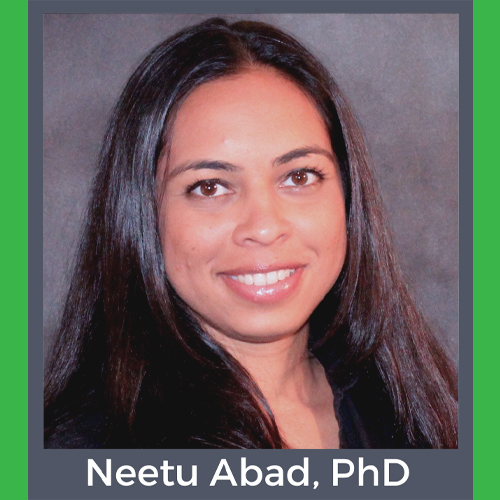
Episode 11: From Ebola to COVID-19: Life as a Behavioral Scientist at CDC with Dr. Neetu Abad
Neetu Abad, PhD is a Behavioral Scientist for the Immunization Systems Branch at CDC headquarters in Atlanta, and serves as a mentor for the PHI/CDC Global Health Fellowship Program. She has worked at CDC for over 10 years and holds a PhD in social psychology. She discusses her path to global health and her work on vaccines and outbreaks as a Behavioral Scientist, from responding to the Ebola outbreak in West Africa to her current work on the COVID-19 response in the US.
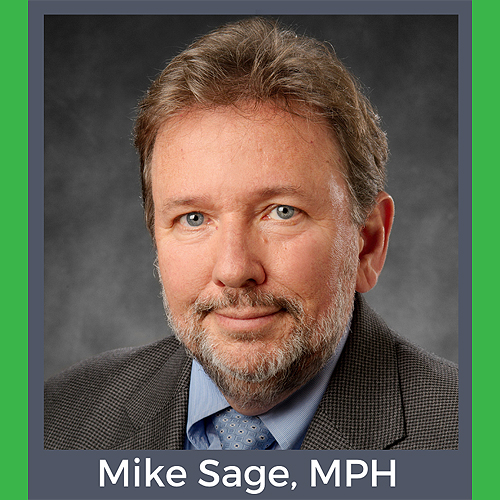
Episode 10: Reflecting on Over 30 Years at CDC with Mike Sage, MPH
Mike Sage, MPH is Program Director for the PHI/CDC Global Health Fellowship Program. He currently holds an appointment as Guest Researcher at the Centers for Disease Control and Prevention (CDC) and serves as a senior consultant to the Public Health Institute (PHI). In this episode, Mike reflects on his career of 34 years at CDC which included leadership positions in the Public Health Portfolio Management Program, the Office of Terrorism Preparedness and Emergency Response, and Policy, Evaluation, and Planning at the National Center for Environmental Health, among others.
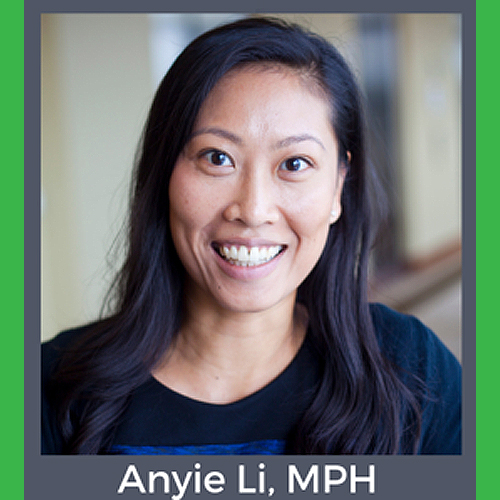
Episode 9: Vaccine Introduction as a Fellow and Epidemiologist at CDC with Anyie Li, MPH
Anyie Li, MPH is an Epidemiologist and CDC Foundation Field Employee for the Vaccine Introduction Team, in the Immunization Systems Branch, Global Immunization Division, within CDC’s Center for Global Health. Anyie is an alumna of the PHI/CDC Global Health Fellowship Program and served as a Fellow from 2016 to 2018 on the same team she currently works on in Atlanta, Georgia. She discusses her first exposure to public health working on the Thailand/Myanmar border with refugees, as well as her current work on the HPV vaccine and COVID-19 response.
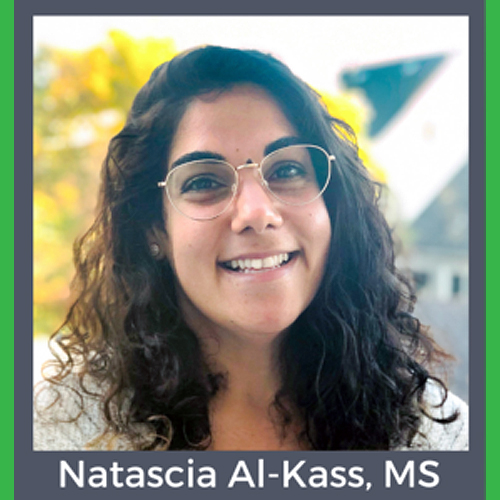
Episode 8: Global Health Recruitment & Fellowship Support with Natascia Al-Kass, MS
Natascia Al-Kass, MS, is the Recruitment & Fellowship Support Coordinator for the PHI/CDC Global Health Fellowship Program, based in Oakland, CA. Natascia shares her expertise in leading the program’s recruitment process and supporting domestic and overseas-based fellows throughout the program year.
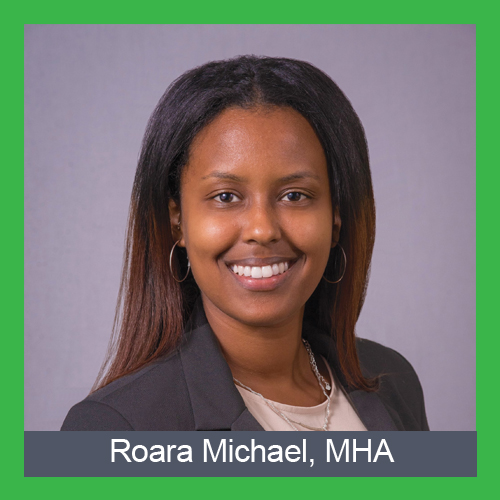
Episode 7: Global Health Outreach & Virtual Networking with Roara Michael, MHA
Roara Michael, MHA, is the University Liaison Program Officer at the Consortium of Universities for Global Health based in Washington D.C.. Roara leads PHI/CDC’s outreach efforts with universities and public health programs across the country, and supports Fellows seeking professional development opportunities.
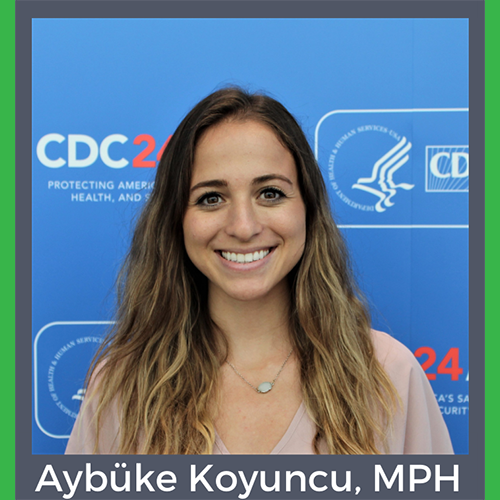
Episode 6: Strengthening Access to Immunizations with Aybüke Koyuncu, MPH
Aybüke Koyuncu, MPH, is a PHI/CDC Global Epidemiology Fellow within the Immunization Systems Branch at CDC’s Center for Global Health. In this episode, Aybüke discusses her work supporting interventions aimed at improving coverage of routine immunizations and data analysis on public knowledge, attitude and practices related to immunizations around the world.
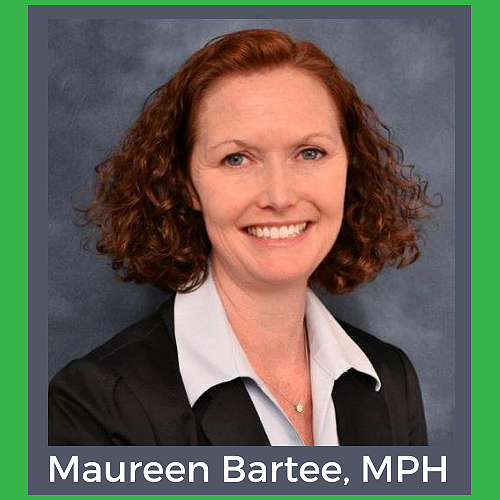
Episode 5: Lessons in Global Health Security at CDC with Maureen Bartee, MPH
Maureen Bartee, MPH, is the Associate Director for Global Health Security within CDC’s Center for Global Health. She holds 22 years of experience with CDC, and currently leads CDC’s work on their global health security agenda, policy and strategy discussions with other US agencies and international partners.
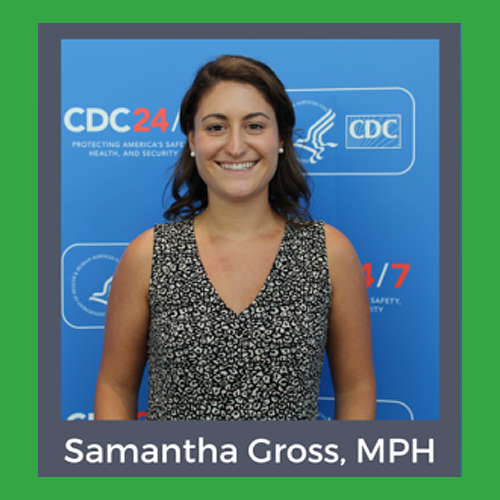
Episode 4: Emergency Response & Monitoring & Evaluating Outbreaks with Samantha Gross, MPH
PHI/CDC Monitoring & Evaluation Fellow, Samantha Gross, MPH, discusses her experience with CDC Center for Global Health’s Division of Global HIV & Tuberculosis. She has held 3 assignments with CDC’s Emergency Operations Center responding to the COVID-19 pandemic. Samantha discusses her background working in monitoring and evaluation and global health, and emergency response.
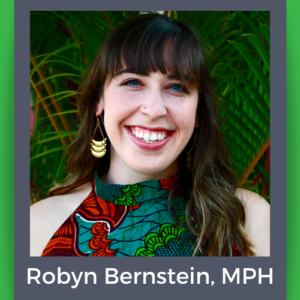
Episode 3: Mitigating COVID-19 & Supporting CDC Zambia with Robyn Bernstein, MPH
PHI/CDC Surveillance Fellow, Robyn Bernstein, MPH, discusses her experience with CDC Zambia’s Division of Global HIV & Tuberculosis. Robyn also elaborates on her time as Strategic Information Coordinator for the COVID-19 International Task Force- Strategic Information Unit Mitigation Team, part of CDC’s Emergency Operations Center.
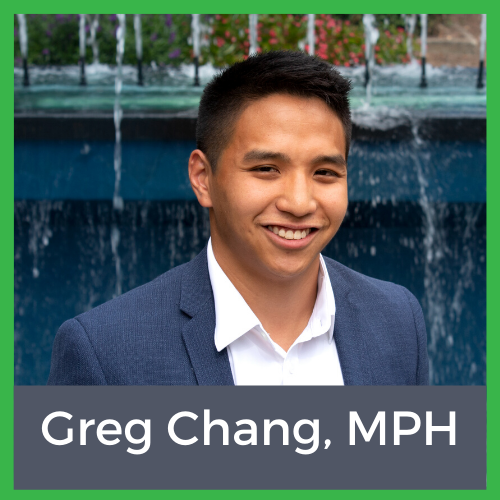
Episode 2: Mapping COVID-19 & Building Global Health Capacity with Greg Chang, MPH
PHI/CDC Surveillance Fellow, Greg Chang, MPH, discusses his experience serving on CDC’s International Epidemiology Team responding to COVID-19 and his work on Population-based HIV Impact Assessments with the Division of Global HIV & Tuberculosis for CDC’s Center for Global Health.
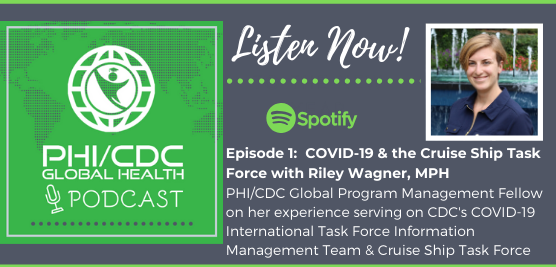
Episode 1: COVID-19 & the Cruise Ship Task Force with Riley Wagner, MPH
The first episode features Riley Wagner, MPH, who is a Global Program Management Fellow for CDC’s Center for Global Health Headquarters in Atlanta, Georgia. Riley was the first of currently 24 Fellows to be assigned to CDC’s Emergency Operations Center in response to the COVID-19 Pandemic. Riley discusses her experience on the EOC and elaborates on her work with the Cruise Ship Task Force.
About the Podcast:
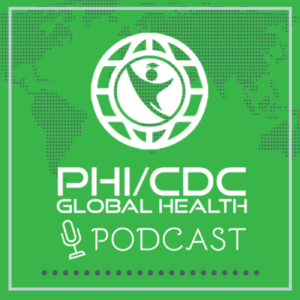 The PHI/CDC Global Health Podcast features stories from the PHI/CDC Global Health Fellowship Program, a U.S. Centers for Disease Control and Prevention-funded program, implemented by the Public Health Institute, where Fellows are guided by leading global health experts from CDC. Fellows work on the front lines of global health, developing the technical and professional skills needed to make meaningful contributions to today’s global health challenges.
The PHI/CDC Global Health Podcast features stories from the PHI/CDC Global Health Fellowship Program, a U.S. Centers for Disease Control and Prevention-funded program, implemented by the Public Health Institute, where Fellows are guided by leading global health experts from CDC. Fellows work on the front lines of global health, developing the technical and professional skills needed to make meaningful contributions to today’s global health challenges.
Listen on Spotify:
Listen on iTunes:
PHI’s Experts Discuss Building Resilience and Well-Being in Communities Through Equity
Julia Caplan and Holly Nickel from PHI’s State of Equity joined the NACDD Board President’s Challenge Podcast, “Resilience at the Community Level” to discuss how to build resilience and well-being in communities through equity.
Building resilience is foundational to promoting healthy communities, but you can’t promote healthy communities without promoting equity. Julia Caplan and Holly Nickel, from PHI’s State of Equity, sat down with the National Association of Chronic Disease Director (NACDD) Board President’s Challenge Podcast to discuss the Health in All Policies (HiAP) model, the Capitol Collaborative on Race and Equity (CCORE) program, and how resilience and wellbeing are centered in all of their work.
In part one, they share how the differences in access to resources and opportunities that communities have, in addition to the experience of being targeted by racism, have significant health and physiological impacts on the individual and community levels. Caplan and Nickel also detail how their work is honoring the longstanding community-based efforts to promote equitable and healthy communities.
In part two, Caplan and Nickel dive deeper into how State of Equity is breaking down silos and leveraging a network of state-government entities to increase awareness of how institutional racism is being created and maintained systemically, and what strategies are needed in policy and practice to advance equity as both a process and an outcome.
Podcast: PHI’s Linda Rudolph on Climate Change-Driven Health Impacts and Solutions
In this Healthy Living Healthy Planet Radio podcast interview, PHI’s Linda Rudolph discusses the health implications that come with climate change and how public health leaders are promoting equitable solutions to help mitigate and adapt to climate change.
Climate change is a global public health crisis. To help communities prepare, public health experts are working alongside local leaders to find new and creative ways to mitigate and adapt to the adverse effects of climate change.
In this episode of Healthy Living Healthy Planet Radio, host Bernice Butler speaks with Sam Calisch with Rewiring America; Debbie Ley with the Energy and Natural Resources Unit of the United Nations Economic Commission for Latin America and the Caribbean; and Dr. Linda Rudolph, program director of PHI’s Center for Climate Change and Health. Dr. Rudolph shares insights on how climate change is already creating a negative environment and health impacts—especially for our most vulnerable populations including seniors, children, pregnant women, communities of color, farmworkers and low-income communities.
Listen to the full podcast or watch the YouTube recording below to learn more about how public health leaders are working to find climate solutions that promote health and health equity.
Also available on Spotify, Google Play, Anchor, Radio Public, Apple Podcasts and Stitcher.
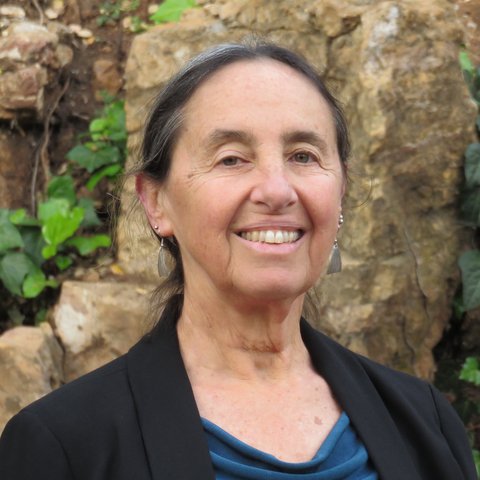
Doctors and public health leaders across the country are advocating for the policies that we know are going to make a difference for our health and for the climate and that's at a local level and a state level and at a federal level… trying to make sure that our climate solutions are also the solutions that promote health and health equity.Linda Rudolph, MD, MPH
Program Director, PHI’s Center for Climate Change and Health

Climate change really is a health emergency… we're seeing heat illness and deaths from extreme heat, lung and park impacts from wildfire smoke, increases in vectorborne diseases, like Lyme disease or West Nile virus, injuries and displacement from people's homes from extreme storms and flooding, more challenges with access to clean drinking water, failing crops that are making food prices rise and we're seeing more and more people, especially young people who are experiencing mental health impacts like anxiety and depression because of concerns about climate change and the future. We're seeing these effects, especially in our most vulnerable populations, seniors, children, pregnant people, communities of color and low-income communities.Linda Rudolph, MD, MPH, program director of PHI’s Center for Climate Change and Health
Podcast: Innovating to Meet Reproductive Health Needs with Multipurpose Prevention Technologies
On this episode of “One World, One Health” podcast, Dr. Bethany Young Holt of PHI’s CAMI Health discusses Multipurpose Prevention Technologies (MPTs)—products that combine contraceptives with sexually transmitted infection (STI) prevention.
Do women get STIs as often as men? Why do women need MPTs? Aren’t condoms enough? What do these technologies look like?
On this episode of the “One World, One Health” podcast, Dr. Bethany Young Holt of PHI’s CAMI Health discusses Multipurpose Prevention Technologies (MPTs)—products that provide not just contraception, but protection against HIV and other sexually transmitted infections for people around the world.
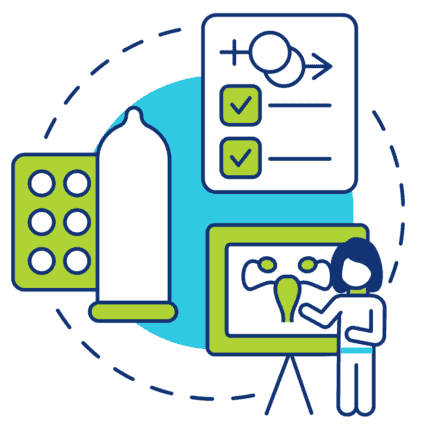
Multipurpose Prevention Technologies — Innovating to Meet Women's Needs
Dr. Bethany Young Holt is the Founder and Director of PHI's CAMI Health, an organization dedicated to advancing the health of women and girls worldwide. She is also the Co-Founder and Director of the Initiative for MPTs (IMPT), and a Principal Investigator (PI) at the Public Health Institute. She is a lecturer in the Department of Public Health at California State University, Sacramento. She has over 25 years of experience working on health prevention programs and research projects in the United States, Africa, and South Pacific. Bethany holds a PhD in Epidemiology, an MPH in Maternal and Child Health from University of California, Berkeley, and a BS in Biology from the College of Wooster.
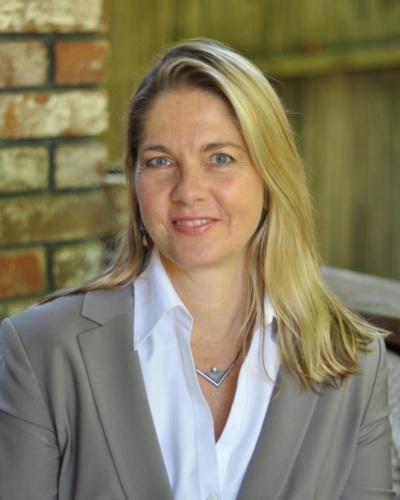
When you empower women to protect themselves around their health—when and if they want to have children—that improves not only the woman’s life, but the economic well-being of her family and the whole community. So when women are protecting themselves from HIV and unintended pregnancy, they’re protecting their children that are living and the ones that are to come.Dr. Bethany Young Holt
Founder & Director, PHI’s CAMI Health
Podcast: Understanding Extreme Heat’s Causes and Symptoms
Dr. Linda Rudolph, of PHI’s Center on Climate Change and Health, discusses the impact extreme heat has on our communities and older adults.
Dr. Thyonne Gordon speaks with Dr. Linda Rudolph, a public health physician and Director of the Center for Climate Change and Health at the Public Health Institute, and Enrique Huerta, Legislative Director at Climate Resolve. Together the trio discuss the impact extreme heat has on communities and older adults, as well as what actions can be taken to protect ourselves and our loved ones.
Listen To The Podcast:
See a clip from the podcast, with tips from Dr. Rudolph on staying safe and cool during heat events:
Podcast: Emerging Trends in Addiction Medicine
In this podcast series, PHI’s CA Bridge shares strategies for how hospitals and health care providers can address the overdose crisis with evidence-based care.
PHI’s CA Bridge save lives by making it possible for people who use drugs to get treatment at any hospital—whenever and wherever they need it.
The Emerging Trends series shares learnings from hospitals that are advancing overdose prevention and treatment, featuring insights from hospitals that are part of the CA Bridge Centers of Excellence project. Topics include: best practices for low-threshold access to buprenorphine treatment for opioid use disorder; emerging treatment pathways for stimulant use disorder; post-overdose care; and more.

Episode 6: Case Studies on Precipitated Withdrawal
Real world case studies on precipitated withdrawal are discussed.

Episode 5: Just Start It: Buprenorphine Self-Starts
Starting patients in withdrawal on buprenorphine is safe – so safe in fact, patients can successfully do it on their own. We’ll talk through the details of how to prescribe buprenorphine self-starts and the coaching for patients that goes with it.

Episode 4: Innovations in Post Overdose Care
Starting post-overdose buprenorphine is safe and saves lives at a moment when patients are most at risk for a repeat overdose and death. Combining effective treatment with suicide screening can save even more lives.
Presenters: Leslie Mukau, MD and Aimee Moulin, MD

Episode 3: New Best Practices in Harm Reduction: Fentanyl Test Strips, HCV/HIV Testing, and More
Naloxone saves lives, but a functioning take-home naloxone program should be just one component of wraparound harm reduction services from the emergency room. Learn the latest best practices including fentanyl test strips, STD testing, and more
Presenters: Josh Luftig, PA-C and Arianna Sampson, PA-C

Episode 2: Precipitated Withdrawal: What You Need to Know
Precipitated withdrawal prompted by buprenorphine initiation doesn't have to be scary for the patient or provider. Learn how to avoid it with smart and proven treatment.

Episode 1: Buprenorphine Starts for Fentanyl Use
Facts vs Fear: As fentanyl spreads in many communities, buprenorphine is still an effective tool for treating patients with just a few clinical tweaks.
Presenters: Hannah Snyder, MD & Erik Andersen, MD
More ways to listen and subscribe
- Listen on Spotify
- Listen on Google Podcasts
- Listen on Amazon Music
- Listen on Podcast Addict
Podcast: Designing Health into Everyday Life with PHI’s Building H
On this podcast, PHI’s Steve Down and Thomas Goetz, co-founders of PHI’s Building H, discuss how the program and their collaborators are developing tools to help companies understand the impacts of their products and services on the health and well-being of their users.
Is the everyday world making us sick? Can we hold companies responsibility for the health consequences of their products and services? How do you design health into the operating systems of our civilization?
On the episode “Designing Health into Everyday Life” of the podcast Design Lab with Bon Ku, Steve Down and Thomas Goetz, co-founders of PHI’s Building H program, discuss how Building H and their collaborators are developing tools to help companies understand the impacts of their products and services on the health and well-being of their users.
Listen to the podcastListen to the podcast to learn about these topics:
- How companies are impacting the health of individuals.
- How Building H measures a company’s impact on health.
- How companies can use the index to design new products and services to support our health.
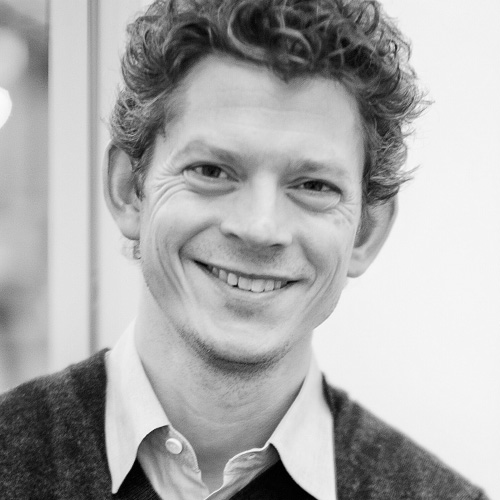
Ultimately, what we are trying to do, just as these products have on their users' behavior, we are trying to have an impact on the companies’ behavior and trying to help them understand that these issues have really been invisible. By putting them out there, hopefully, they’ll recognize that there is an opportunity. If their users come out healthier and feel more positive and sustained by using your product, that is a good metric.Thomas Goetz
PHI’s Building H co-founder
Building H is a not-for-profit project which aims to reverse the course of chronic disease in the U.S. by building health into everyday life. We believe the infrastructure of our daily life—our food, our transportation and housing, and our entertainment—can be reimagined with health and well-being as explicit design goals.
NACCHO Podcast: PHI’s Dr. Mary A. Pittman Discusses Healthy People 2030
In this NACCHO Podcast from Washington episode, PHI’s President and CEO Dr. Mary Pittman joins NACCHO’s Ian Goldstein to speak about the goals of the Healthy People 2030 initiative.
Healthy People identifies public health priorities to help individuals, organizations, and communities across the United States improve health and well-being. Healthy People 2030—the initiative’s fifth iteration—builds on knowledge gained over the first four decades, and includes 355 core, measurable objectives as well as developmental and research objectives. PHI President and CEO Mary A. Pittman serves as a member of the Secretary’s Advisory Committee on National Health Promotion and Disease Prevention Objectives for Healthy People 2030.
On this Podcast from Washington, Dr. Pittman joins NACCHO’s Ian Goldstein to speak about the goals of the Healthy People 2030 initiative, and how PHI is incorporating those objectives into its work. She also shares tips for how state-led organizations and health departments can engage stakeholders in adopting the Healthy People 2030 framework.
Dr. Pittman’s interview begins at roughly 12:50.
Hear the podcast
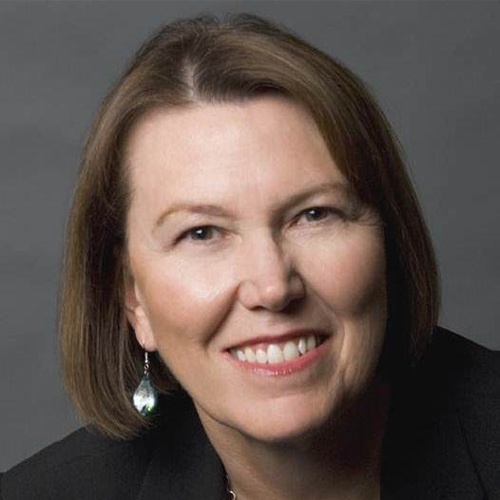
The community-based organizations that have been our partners throughout COVID have to be continued as our partners post-COVID—because that’s the real base of our ability to create the healthiest population.Dr. Mary Pittman, PHI’s President and CEO, & Member of the Secretary’s Advisory Committee on National Health Promotion and Disease Prevention Objectives for Healthy People 2030
Learn more about the PHI programs and projects, discussed by Dr. Pittman:
- The Healthy Places Index (HPI): The California Healthy Places Index (HPI) is a powerful tool, developed by PHI’s Public Health Alliance of Southern California, to assist communities in exploring local factors that predict life expectancy and comparing community conditions across the state. The HPI provides overall scores and more detailed data on specific policy action areas that shape health, like housing, transportation, education and more.
- Health in All Policies: Health in All Policies (HiAP) is a collaborative approach to improving the health of all people by incorporating health considerations into decision-making across sectors and policy areas. PHI’s first-in-the-country HiAP team provides technical support for initiatives in local governments and municipalities, at the state level, and in countries outside the U.S.
- Supporting communities in responding to COVID-19: PHI and its programs are working rapidly to respond to COVID-19, on local, national and global levels. PHI’s programs are working within and alongside our most-impacted communities, organizing contact tracing efforts, creating a workforce from within impacted neighborhoods, working with trusted leaders, messengers and community-based organizations to dismantle barriers to vaccine access, and partnering with private, governmental and philanthropic sectors to bolster efforts. Learn more about how PHI and programs are responding to COVID and working with communities to support vaccine equity.
Webinar Recording: DDT Exposure in Grandmothers Linked to Obesity, Earlier Periods in Granddaughters
New Meaning of “Persistence” for an Environmental Chemical Banned 50 Years Ago
In this webinar, Dr. Cohn, director of PHI’s Child Health and Development Studies, discussed her recent research which found that young women today may face increased health risks linked to breast cancer due to their grandmothers’ exposure to the banned pesticide DDT.
Learn more about the studyThis was the first study to report on the health effects of exposure to a toxic environmental chemical over three human generations, and found that granddaughters whose grandmothers were exposed to the pesticide DDT have higher rates of obesity and earlier first menstrual periods. This may increase the granddaughters’ risk for breast cancer as well as high blood pressure, diabetes and other cardiometabolic diseases.
This research was conducted by PHI’s Child Health and Development Studies where 15,000 pregnant women donated blood samples during and shortly after their pregnancies in the 1960s. These women have been followed for their own health and the health of their daughters and granddaughters for over 60 years.
This work is the first to show such a 3 generation effect for a pesticide in humans and gives new meaning to the idea of “forever” chemicals. Dr. Cohn discussed what this study means for current generations of women and current environmental issues.
This webinar is one in a monthly series sponsored by the Collaborative on Health and the Environment’s EDC Strategies Partnership.
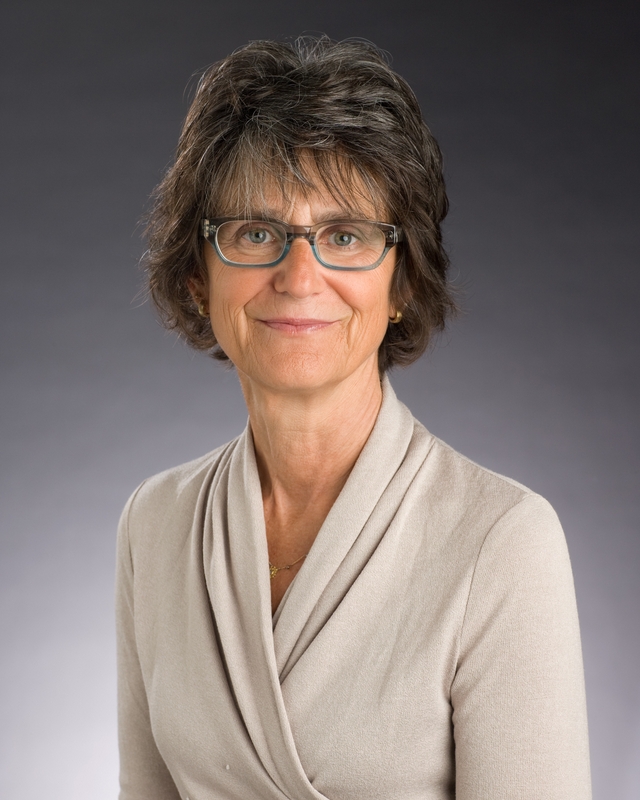
Featured Speaker: Barbara A. Cohn
Barbara A. Cohn, PhD, is director of the Child Health and Development Studies (CHDS) at PHI. CHDS is home to a groundbreaking study, which originated in 1959, designed to shed light on the various factors impacting health during pregnancy and early childhood. Between 1959 and 1967, 15,000 pregnant women and their families were enrolled. Researchers continue to study these rich data and conduct important follow-up studies to further examine how events during pregnancy impact the subsequent health of fathers, mothers and their children and grandchildren. Cohn consults with researchers around the world on the use of the CHDS data for health research.
In addition, Cohn directs research examining how pregnancy protects against breast cancer and influences other health problems in mothers and their children in order to identify natural protective mechanisms that can be used for prevention. She also investigates whether early life exposure to environmental chemicals during pregnancy affects obesity, immune function, reproductive health, cardiovascular disease, diabetes, neurodevelopment, cancer, and health disparities in mothers and their children across the life span.
Cohn holds a doctorate in epidemiology, a master’s degree in city and regional planning, a master’s degree in public health planning and a bachelor’s degree in zoology, all from the University of California, Berkeley.
Going Viral: Marta Induni Joins Paula Poundstone to Discuss Contact Tracing
Listen to PHI’s Marta Induni talk about contact tracing with Paula Poundstone. Find out more about how contact tracing works and why it is so critical in fighting COVID, on Nobody Listens to Paula Poundstone.
With the surge of COVID-19 cases in the U.S., contact tracing has become vital in stopping COVID-19. In this episode of Nobody listens to Paula Poundstone, PHI’s Marta Induni discussed PHI’s Tracing Health—one of the earliest contact tracing initiatives in the U.S.—and how the initiative helps support communities that have been most adversely affected.
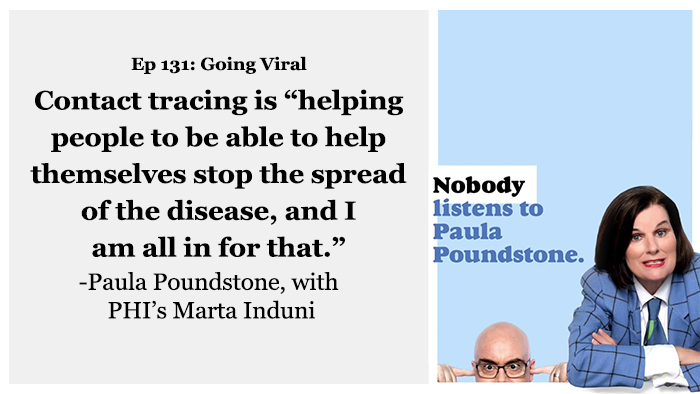
Listen here
Work With Us
You change the world. We do the rest. Explore fiscal sponsorship at PHI.
Support Us
Together, we can accelerate our response to public health’s most critical issues.
Find Employment
Begin your career at the Public Health Institute.
